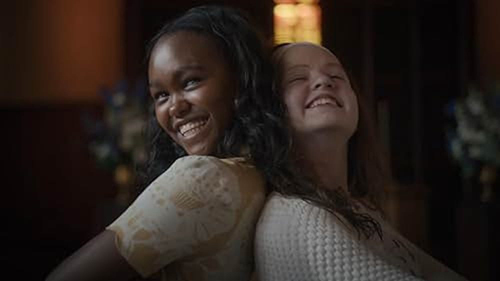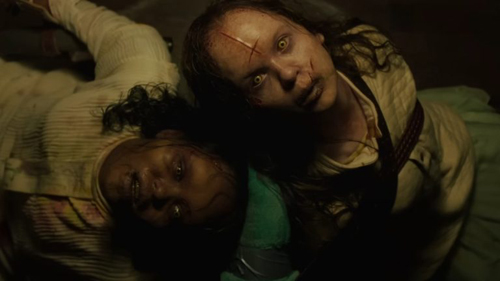
Your complimentary articles
You’ve read one of your four complimentary articles for this month.
You can read four articles free per month. To have complete access to the thousands of philosophy articles on this site, please
Films
The Exorcist: Believer
Susan Hopkins is horrified, but in a thoughtful way.
The Exorcist: Believer (2023) is the latest in a long line of supernatural horror films that have attempted to emulate the commercial and critical success of the late William Friedkin’s iconic The Exorcist (1973). It seems there is something so deeply compelling in the mythology of an innocent girl corrupted by a demonic entity that it still resonates in the popular imagination some fifty years later. Unravelling the philosophical ideas at the dark heart of demonic possession horror, however, is a slippery business, especially in the current political climate, for as much as we like to think that our attitudes toward religion, illness, sex and the body have evolved, what fascinates and frightens us, or what disgusts us and yet draws us in, is much the same as it ever was. While The Exorcist: Believer pays its dues to modern demands for diversity and inclusion, it still invokes ancient warning messages and meanings about monsters from the underworld. As evidenced by the huge commercial success of the Conjuring horror franchise of the 2010s, even well-educated, jaded, postmodern audiences apparently want to believe, not just in the existence of evil, but in the Devil as a knowable and nameable entity. And as the director of The Exorcist: Believer, David Gordon Green, has recently observed, horror is one of the few remaining forms of popular culture where sensitive and provocative images and ideas can be creatively pushed to their titillating extremes. Thus, in mainstream horror cinema, disturbing representations of moral chaos, corruption, illness, and suffering might still be explored relatively free of personal and social censorship.
Horror Nostalgia
As with the recent sequels in the Halloween franchise (also directed by David Gordon Green), The Exorcist: Believer explicitly courts nostalgia for the themes and narratives of 1970s Hollywood horror classics. Believer also revives the soundtrack, symbolism, and characters of the original film. Ellen Burstyn, who played Chris MacNeil, the hapless single mother of demon-possessed child Regan (Linda Blair) in the original Exorcist, makes a much-vaunted return in Believer as an ageing amateur demonologist. Similarly, the recent Conjuring film franchise revived folklore surrounding the real-life demonologists Ed and Lorraine Warren, who first found fame in the 1970s. Jason Blum, who produced both The Conjuring and The Exorcist: Believer, seems very aware of the commercial potential of possession narratives, which are themselves inspired by real-life exorcisms from the 1970s. None of the contemporary cinematic characters come close, however, to the grit and gravitas demonstrated by the heroic Catholic priest of the original Exorcist, Father Damien Karras (Jason Miller). Similarly, none of the new demonic possession films engage with the moral and philosophical dilemmas as effectively as the first film did, such as the tensions between faith and reason, and religion and science.
Of course, many contemporary young cinema-goers never knew the original Exorcist, and especially how it perfectly captured the moral-political chaos, and sheer strangeness, of the cultural zeitgeist of the 1970s. That was a time of social and economic decline, when we of Generation X were largely left to raise ourselves. In that pre-internet time, much of the adult world was still shrouded in mist and mystery to us, and literal or metaphorical corruption seemed to lurk around every dark corner. Little wonder the Devil seemed more real and visible then, including in expressions of popular culture such as The Exorcist and The Omen (1976).

Before
Film images © Universal Pictures 2023
Bloody Hell
In The Exorcist films, and other theological horror stories, the Devil is the ultimate enemy within, penetrating the family and even the body of the possessed child.
As philosophers George Lakoff and Mark Johnson have pointed out (Metaphors We Live By, 1980), “moral concepts are defined by metaphors.” Moral impurity is typically metaphorically associated with the body – especially the stained, sick and soiled body. Indeed, terrifying images of the Antichrist, whether depicted in a Fifteenth Century religious painting or a contemporary horror film, move us because metaphors – of the body, the father, and the mother – are typically how Christian spirituality is expressed.
As with the original Exorcist, much is made in The Exorcist: Believer of blood leaking from young female bodies as an apparent sign of impurity, corruption, and impending doom. As the philosopher Julia Kristeva famously pointed out, abjection – that is, the lowest debasement or defilement – is typically linked to bodies, especially female bodies (Powers Of Horror: An Essay On Abjection, 1982). Bodily fluids and sick bodies are regarded as particularly contaminating and repulsive. Hence the shock value of the possessed girl vomiting into the face of a Catholic priest in The Exorcist. If, as Kristeva claimed, the openings of the body are yet another source of cultural anxiety, it should come as no surprise that so much supernatural horror features girls and young women with open wounds, open mouths, and inverted cross incisions in their flesh, vomiting blood and bile.
True to the genre, The Exorcist: Believer includes a ridiculous amount of blood and vomiting. The horrific climax of the film also has a pale, possessed girl chanting “the body and the blood” as she stomps down a church aisle, the crotch of her white dress stained blood red. In this the film articulates collective fear and revulsion regarding the messy aspects of the body and its desires. Another primal fear played upon here is that of losing control over one’s own body. In this way the possessed girl is presented in The Exorcist: Believer as a kind of repulsive, shameless, feminine monstrosity. (Still, one wonders, in the age of mainstreamed pornography, has she nothing more obscene to say?)
Building on the work of Kristeva, film scholar Barbara Creed argued in the 1990s that much Hollywood horror plays on mixed feelings about female sexuality and reproductive capacities (The Monstrous-Feminine: Film, Feminism, Psychoanalysis, 1993). In her psychoanalytical approach to horror, Creed explained that changing, reproductive female bodies are often negatively presented in popular culture as disgusting, threatening, or even monstrous. Certainly this does seem to be the case in demonic possession films. In The Rite (2011), for example, a Catholic priest played by Anthony Hopkins attempts to exorcise a sixteen-year-old girl who is both possessed and heavily pregnant. We know she is still possessed, however, when she crawls about attempting to seduce Hopkins’ sceptical apprentice.

After
Diverse, Evil & Inclusive
The single-parent-under-pressure white mother of The Exorcist is reimagined in The Exorcist: Believer as a black widower, but still struggles to raise a troubled teen going through puberty. Like Regan before her, the formerly innocent Angela is undergoing a disturbing transformation. And all hell breaks loose (once again) when lonely, disaffected teenagers start playing with a Ouija board. Yet for two possessed teenage girls, Angela and Katherine remain remarkably well spoken. Even the Devil himself apparently speaks with an English accent.
The Exorcist: Believer is a pale imitation that does not come close to the original in terms of shock value or ominous atmospherics. While it carefully reproduces the genre conventions of a demon defiling the body of an innocent girl, the imagery here is not nearly so sexualised or as horrific as in the 70s classic. Despite his promise to push boundaries, David Gordon Green mostly plays it safe with some of the last taboos of our culture – those surrounding parenthood, adolescence, sexuality, and illness. Still, we do get some sense of creeping dread through the gradual unravelling of a parent who is increasingly afraid of his own child, a cat-eyed girl who is always creeping up too close to him. Perhaps these ‘demon child’ films hint at a usually unspeakable question any stressed modern parent might be wanting to ask: Is this parasitic, uncanny Other, so like me but not me, actually a demonic entity?
Believer attempts to ramp up the uncanny by twinning the demon child with two possessed girls (one black, one white) in (literally) back-to-back exorcisms. As we’ve come to expect with these films, the Devil announces himself through inscriptions on the skin. Similarly, horror and revulsion are courted through an escalating transgression of the boundary between inside and outside the body. When ‘help me’ is scratched out on the possessed girl’s thigh, from the inside, something has to be done.
Apparently, no one wants to cast a Catholic priest as heroic anymore, so the very modern harried and overprotective parents take centre stage. A multitude of spiritual healers from diverse faiths jostle for screen time in the new film too – which makes some of the exorcism preparations confusing and almost comic (could someone please just call Father Damien Karras?). However, the resolution of the film does bring a satisfying symbolic return to moral order, restoring the health of the family and rearticulating clear lines between good and evil. As we expect.
The writers, producers, and director of The Exorcist: Believer deserve some credit for working hard not to exclude or offend anyone with their new take on demonic possession. In the process, though, they seem to have lost touch with the first principle of what makes horror so horrifying in the first place. As Kristeva points out, the power of horror lies in its very ability to upset and transgress moral and political boundaries, courting fear and revulsion in equal measure.
According to internet rumour, yet another possession film is already in planning (that would be the seventh Exorcist sequel); but perhaps one good thing about all these films is that they inspire you to revisit the original. Like all the films I’ve mentioned, The Exorcist is currently accessible on streaming platforms. But be warned. Fifty years on, that film still has the real power of horror to make you think deeply and scare the hell out of you at the same time.
© Dr Susan Hopkins 2024
Susan Hopkins is an associate professor of academic communication at UniSQ College at the University of Southern Queensland, Australia. She holds a PhD in social science, and a Masters in education.









